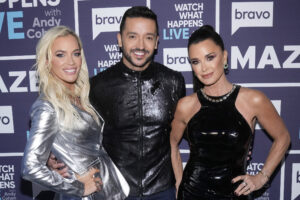Soap Opera Digest: The last time we spoke, your memoir, I’ll Be Damned, was about to come out. Have you been pleased by the reception that the book has gotten?
Eric Braeden: Very pleased — and very surprised. Yeah.
Digest: Why surprised?
Braeden: To be honest with you, I had no idea that it would evoke any interest in anyone! I really did not know. I had no clue. So, it is very surprising and, obviously, very encouraging to know that people actually are interested. I’m happily surprised.
Digest: On your book tour, what was the feedback you were getting from readers?
Braeden: The problem with book tours is that people stand in line to get a signature in their books, so you don’t really get to listen to their comments. It’s rare there’s a forum to exchange ideas about the content of the book. But you hear comments, obviously, in passing about how much they like this or that or whatever, and over the months you sort of begin to understand what they reacted to and what they liked. I think overall it’s a notion that this is really an example of the life of many, many, many immigrants who have come to this country at one time or another, and who have, against all odds accomplished something — that it’s actually quintessentially sort of an American story. Your parents or grandparents came to America with nothing in their pockets with the kind of anticipatory anxiety that everyone has when they set foot in a foreign country. That’s something that somehow, every American has in his memory, through stories told by grandparents or great-grandparents, handed down from one generation to the other.
Digest: Did you have conversations with your castmates at YOUNG AND RESTLESS about the book?
Braeden: One or two came up or whatever and found it very interesting and expressed that they liked it, but beyond that, no.
Digest: There’s work to do, huh?
Braeden: There’s work to do, and that’s the difference between daytime and a nighttime set. If you work on a nighttime set, you have time to sit and talk because it takes a long time to light a new scene. In daytime, it’s an assembly line. It is extraordinary how fast we do this, and so there’s no time, really.
Digest: Ultimately, what was the book tour like for you — tiring? Invigorating?
Braeden: It was very pleasant, but traveling can be a pain in the ass, as you know. On the whole, though, it was very encouraging, very pleasant, and sometimes inspiring — but I’m not going to do any more [traveling] for a while!
Digest: I had the opportunity a few months back to interview a friend of yours, Stephen A. Smith (Brick, GH), who posted a photo of a dinner he shared with you and Maurice Benard (Sonny, GH).
Braeden: Yeah, he’s a good friend, and a very bright guy, and I enjoy — as you probably have discerned — sports a great deal, and that dinner we all talked. It was very nice to get to know Maurice and talk to him about his experiences over there [at GH], and it was very nice. What connects me and Stephen A. is sports, and we both are very opinionated. Sometimes we agree, sometimes we disagree.
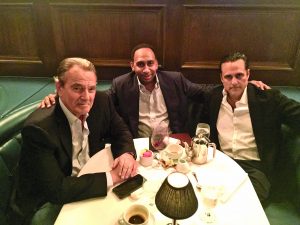
Digest: Speaking of sports, I would love to hear about your experience as grand marshal for the International Boxing Hall of Fame parade.
Braeden: It was very touching, to be honest with you. It’s in Canastota, NY, a town of 5,000 people. It was the hometown of [boxer] Carmen Basilio, who was one of the great fighters in the ’40s and ’50s. He actually beat Sugar Ray Robinson, who is arguably one of the best fighters ever. It’s a museum worth visiting, and of course, for boxing fans, it’s wonderful. They even went so far as to transport the Madison Square Garden ring, in which all the famous fights took place, to Canastota. It’s a treasure trove of information and videos and plaster casts of [fighters’] fists. It was very touching because that town [raised the money for the museum] with volunteer contributions. I’ve been a boxing fan for decades, so when they asked me to be grand marshal since I’ve been a boxing fan for decades, I gladly accepted. It was the induction of Evander Holyfield and there was a parade through town, and they had 15,000 visitors on the day that I was grand marshal. It’s America at its best — just volunteers doing their work.
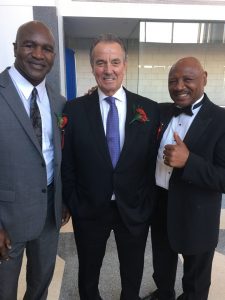
Digest: From one hall of fame to another — you were recently inducted into the German-American Hall of Fame! Tell me about that experience.
Braeden: I was quite touched by it. It meant a great deal to me. The contributions of German-Americans in this country have been enormous and fundamental — and no one talks about it. That has been a beef of mine for years. There are more people in America of German descent than of any other ethnic group, and that is stunning. All this German cultural influence is neglected and not talked about because we had a nutcase [Adolf Hitler] who ran Germany for 12 years. That 12-year period is something that will not describe who I am, and I refuse to accept to be identified with that period. That is not modern-day Germany. There’s always this very kind of slightly sub rosa tendency to connect German with Nazi, and it pisses me off, to be frank with you. I’m probably the first one to have ever spoken about this, as early as the 1980s, when I was interviewed by The Washington Post and talked very openly about how deeply angered I am about it — and yet how deeply I also understand why that is happening, because the crimes committed during that time were horrendous. I don’t mean to distract from what happened in those 12 years. It’s horrendous and probably unparalleled in human history. No question about that. Anyway, I must say I was very proud [to be inducted].
Digest: Did you get a chance to speak to your fellow inductee, Dr. Ruth?
Braeden: Yes, and I was delighted to meet her. I have great respect for her. She obviously conveyed very important things for men and women, and yet she does it with a clarity, and yet, in a humorous way — I mean, she just makes you smile.
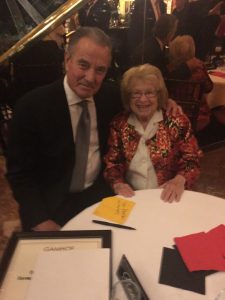
Digest: You recently filmed a role in the new film your son, Christian, is working on. What was it like to collaborate with him?
Braeden: Having my son was one of my great experiences in life. He’s very bright. We discuss politics, we discuss history, we discuss sports, and of course our business and acting and filmmaking, et cetera. He studied film at UCLA and graduated acting first in his class, and he’s a very good writer. He was waiting to be able to direct his own script, and he took an enormous chance doing that, but he finally did. The film is called Den of Thieves. It’s about a break-in of the Federal Reserve Bank in Los Angeles, and it stars Gerard Butler and 50 Cent and O’Shea Jackson. He asked me to do a cameo in it, and at first I didn’t really want to, but I said, “For my son, I’ve got to do it.” It was a delight to see him in the director’s position, and I came to the set the first morning and saw all the honey wagons, makeup and wardrobe and all the generators and said, “My God, this is my son doing it!” It just gave me a moment of pause. I couldn’t have been prouder of him. And then I saw him act with actors, and I realized that a lot of what I told him over the years — what I didn’t like about certain directors and what I liked about others — I saw him put that into action. On so many levels it was just such a wonderful experience for me.
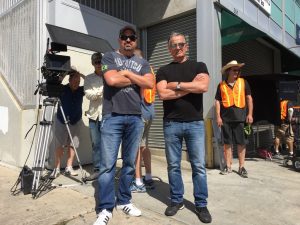
Digest: On-screen, Y&R just finished the arc culminating in Nikki’s concert. How did you feel about the finished product?
Braeden: I thought it was extremely well done. When you consider under what time constraints we work, I just have to take my hat off. The production values were great. The acting — Melody [Thomas Scott, Nikki] was wonderful. Melissa Ordway, who plays Abby, and Amelia Heinle [Victoria] and Joshua Morrow [Nick]. I look at it and I say, “This is damn good.” I was proud of it. [Shooting a soap] is total madness. It’s one or two takes, that’s it. And that means you have to have very good actors who know what the hell they’re doing, and the ones I just mentioned, they all do. It was well-written, it was well-done on all levels. Beautifully lit. Great. I can’t say enough about it, and Mel played it beautifully. I actually was riveted by it.
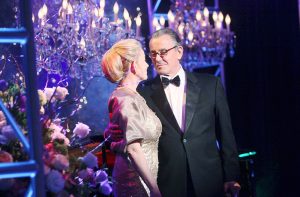
JPI
Digest: Do you have a theory as to why Victor’s romance with Nikki, in particular, has captivated audiences for so long?
Braeden: I have no idea. I would simply say that Mel and I are both very vulnerable, and that comes through in certain moments more than others, but we are vulnerable to each other, and I think therein lies what people connect with. Essentially what people react to, I think, is vulnerability in the characters they watch. I don’t care how mean they are, how ruthless they can be or whatever, but there is a vulnerability, and there’s a vulnerability in this relationship to Nikki and vice versa. I think that is what people respond to. Some actors protect their vulnerability enormously and don’t allow you to get in, and others do. It’s a very peculiar art form in the sense that you are thrown together doing someone else’s dialogue that someone else wrote that you have never met, and yet we both make something out of it, or whoever the actors are do. I think of great scenes recently between Peter Bergman and Eileen Davidson, Jack and Ashley. Great scenes back and forth between brother and sister, and it just — that becomes interesting to watch, because you realize that they touch something in each other, and that is, I think, the essence of what makes perhaps a successful actor.
Digest: That willingness to be moved by the person you’re in the scene with.
Braeden: Exactly. I’ve known really few hard people. Obviously as an actor, you are asked to open up and to show that [vulnerability]. Most people learn to cover up and to hide and to not show it, and that’s where art comes in; you open a window to the inner soul, or the conflicts, or the hurt. Most people who are nasty or angry have been hurt in their childhood. Almost a cliché, but it’s true. Very true.
Digest: I follow you on Twitter, and you seem to get a real kick out of what Y&R fans have to say about the show.
Braeden: Absolutely! Otherwise, you really work in the dark. Having worked in Hollywood as long as I have, over 50 years now, very often you don’t know what the reaction is in the audience everywhere, and then when you have Twitter or you travel around the country doing public appearances, you realize that — I don’t care where they are, in the deep South to the North to Canada, wherever — people are much smarter than most people who are in production give them credit for. They really are. That sometimes is my complaint when I read certain things [in the scripts]. I say, “No, you can’t do that.” There is, for example, the notion of people walking into Victor Newman’s office without knocking at the door. I say, “Where the f–k does that happen? Where in the world does that happen?” And you need to pay attention, because audiences remind you of it. They’re much more discerning and much smarter than most people give them credit for, every bit as smart as the people who write the stuff. I am quite serious about listening to what people say. Some, of course, I realize is not so nice, but most of it, 95 percent of it, is very nice, very observant, very discerning, and I listen to it a lot, and I enjoy communicating with fans.
Digest: From the response to your book, to your interactions on Twitter, to meeting fans on your tour — seeing the reaction that you, and by extension, Victor, evoke in people, what does it mean to you, so many years into your career, that people are still so invested, so connected?
Braeden: It is deeply gratifying, to be frank with you. Deeply. Without that reaction, where would I be? Where would we be? We would have been one of the shows on the heap of discarded shows! I’m deeply grateful that we still engender that kind of reaction. It’s wonderful when you suddenly get a tweet from Sicily or Belgium or Turkey and you just become very aware of the universality of what we do. It’s extraordinary, and that in turn informs you that we have so much more in common with all kinds of peoples with all kinds of ethnic groups — more in common than what separates us, I think, and the separations are usually artificial separations, created very often by leadership in countries for their own purposes. I was in Istanbul at the airport a number of years ago, and I see about 100, 150 veiled women. I thought, “Well, they must be waiting for some Turkish president or whatever.” They were there to see Victor Newman, as I found out! I couldn’t believe it. I was baffled. I said, “This can’t be true.”
Digest: When we spoke last time, you said you had no regrets about what you chose to include in the book. Now that it’s been out in the world, do you still feel that way?
Braeden: I just had that conversation with my youngest brother, who objected to the idea that I talked about my father having had an extracurricular affair or two. He said, “Why did you have to write that?” And I said, “Well, when I found out about it, it made an impression on me. It’s my book, not yours!” But look, as an actor, in a sense, you are in the business of emotions, so you are freer to open up. As an actor you learn to let it all hang out there.
Digest: You’ve been a driving force on Y&R for over 37 years. How do you manage to still come to work every day determined to do your very best?
Braeden: As you get older, you begin to reflect, and that reflection inevitably leads you to the conclusion that you’re very lucky to be working in this business where so few are still working. Since 1962 I’ve worked with all kinds of people who are famous and were well-known in the ’60s and ’70s and ’80s who are no longer [with us]. You realize how fleeting it is, and you realize how deeply grateful one has to be to be able to go to work. And I enjoy it. I still enjoy the moments of doing a scene and realizing that it was real — it felt good, it felt real. I can’t stand it when one leaves a scene and says, “Oh, s–t. That could have been better.” I still enormously enjoy working with some actors, my fellow actors. That hasn’t changed. We’re privileged to be able to do this. My God almighty, look at the statistics of this business! One percent make a living [as actors]! To be working, and to work on the No. 1 show, are you kidding? It’s wonderful! When I think about it, step back a little bit, I’m deeply grateful.




